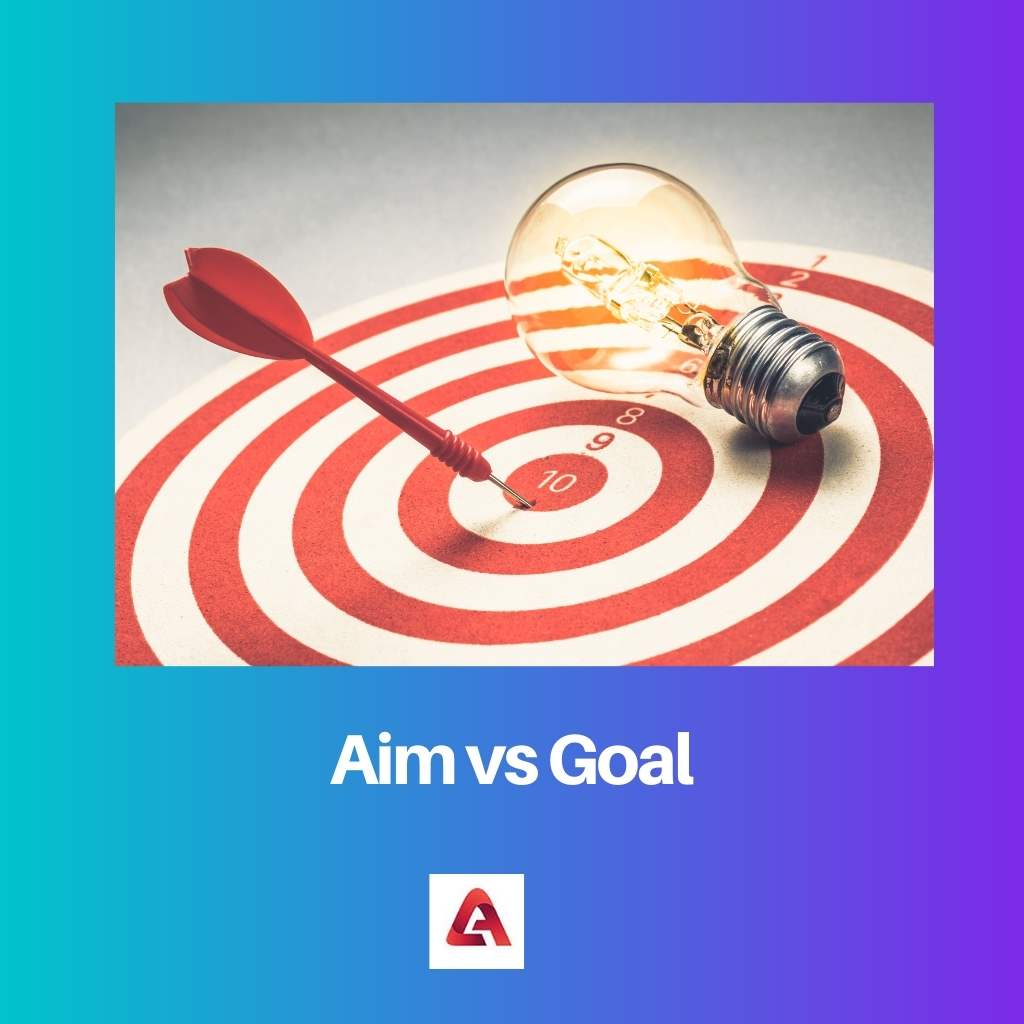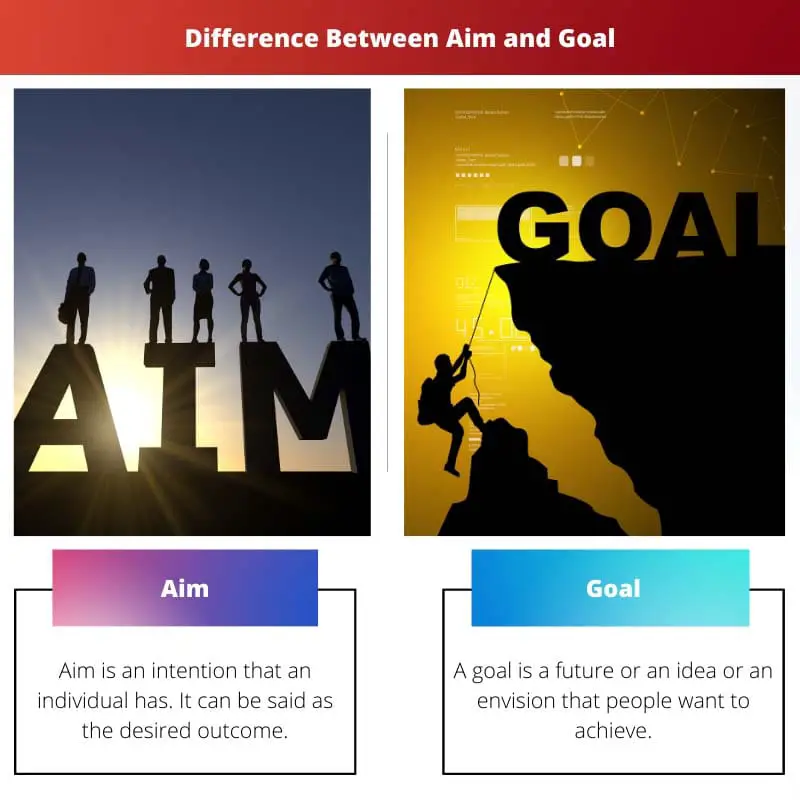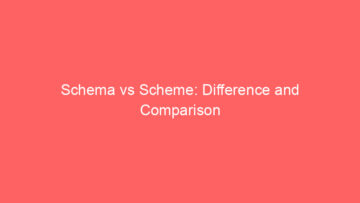Aim and Goal have confused everyone. As children or in any other situation, What is your aim? What is your goal? These two questions have always been asked. People tend to become nervous by these types of questions always.
There is a lot of confusion regarding this. Sometimes aim and goal are used synonymously. But there is a difference between the two. Aim means to target something. The goal is the ultimate end.
People who have aims in their life have to achieve them by reaching their goals. It is very difficult to make a distinction between these two.
Key Takeaways
- An aim is a general direction or purpose, while a goal is a specific, measurable, and time-bound target.
- Aims provide a broad framework for decision-making, whereas goals help set priorities and focus resources.
- Goals can be broken down into smaller objectives or tasks, while aims are the overarching intention behind those goals.
Aim vs Goal
The difference between aim and Goal is that Aim is something that an individual desires to achieve. While a Goal is something that needs to be achieved. Aim is a broad term and can include many things. While the Goal is specific and concrete. The aim is for Long term outcomes. While Goal is a short-term outcome. Aim should be meaningful and should have a purpose to achieve. Achievement is the second name of Goal. How much time it will take to achieve the aim no one knows. But a Goal is a Time-bounding concept.

Aim is an intention that an individual has. It can be said as the desired outcome. Everyone wants to have an aim in life. Aim is something which tells a person what they want to do in their life.
It also gives them an idea of how to achieve it. Whenever we do any research or a school project, we have an aim. That is intended to achieve.
Aim also acts as the aspirations of the people. In life, People can have more than one aim. Fulfilling the aim is time-consuming. It is a long process. One needs to have patience when they are setting what their aims are.
A goal is a future, idea, or vision that people want to achieve. A group of people can plan goals. For that, they commit themselves to achieving. Goals are short-term.
People want to achieve the goal quickly by finishing them in a finite time. A Goal is very much similar to a purpose. A goal can also be said as an end that has an intrinsic value in a person’s life.
A goal is an abstract object that every individual wants to have, whether it be in any office, company, school, organization etc.
Comparison Table
| Parameters of Comparison | Aim | Goal |
|---|---|---|
| Division | Can be divided into objectives. | Steps to reach the aim. |
| Time | Long-Term | Short-Term |
| Measurement | Impossible | Possible |
| Purpose | General | Specific |
| Deals with | Intentions/Aspirations | Achievement/Target |
What is Aim?
Aim is a process where an individual or the company orient or focuses themselves on achieving the desired result. Your actions are responsible for whether you will achieve your goals or not. So it is very important to watch your actions properly.
They are like stepping stones or steps that take us to our success. Aim can be divided into objectives, because the aim is a very broad term. It can include a lot of things.
Whether it is an individual or an organization, there are a lot of aims as Aims are for the long term. Sometimes to be more focused, they are divided into objectives.
So that a part of it can be achieved, we can come one step closer to our goals. The aim is like a big picture that you want to see and work on in some time.
For example, if you want to make flying cars, you have to aim and make it work until it starts flying and landing on the roads.
Setting small goals at a time and then making a plan to achieve the aim is how we get to do this. Once aims are defined, our next step is moving on to the objectives.
Aims are very general. It is like conducting research. In research, firstly, you generalise all the things. Then important things are taken out of it. That forms your objectives.
Objectives are a type of aim. Aims are the aspirations of a people. It is very much time-consuming. One needs to have patience when they are setting their aims.

What is Goal?
Setting the Goal was based on the theory of Empirical Research. It is considered one of the most important theories of organizational psychology.
The founding fathers who gave this theory of setting the goal are Edwin A. Locke and Gary P. Latham. In the findings, it was found by Edwin and Gary that the goals that are very hard to achieve give higher performance than those which are very easy.
When the person is encouraged and motivated to follow their goals, he/she will have good progress. They will be committed and will be able to perform the goals becomes higher.
Goals are important and affect an individual’s performance in certain ways. When Goals are there, it attracts attention and focuses and then the effort is made to do the activities.
When goals are difficult to achieve, it provides better results. Goals increase persistence because of the difficult goals that prolong the effect. Goals and Performance are dependent on each other. There is a positive relationship between the two.
A goal must always be considered important. An individual or the organization should be committed to the goal. Self-efficiency is also an important factor in goal-setting.
People need feedback on their progress. Feedback should be positive, immediate, graphic, and specific. The SMART framework should be inculcated to achieve the goal. Specific, Measurable, Achievable, Relevant, and Time-bounded.

Main Differences Between Aim and Goal
- Aim can be divided into objectives. Goal are the steps to reach an end.
- Aim are Long-term outcomes. Goal are short-term outcomes.
- To measure the aim is impossible. Goals can be measured depending upon certain parameters.
- Aim has a general purpose and is based on the intention. Goal has a specific purpose.
- Aim deals with the aspirations of an individual or a company. Goal deals with the achievement and target of an individual or the company.







